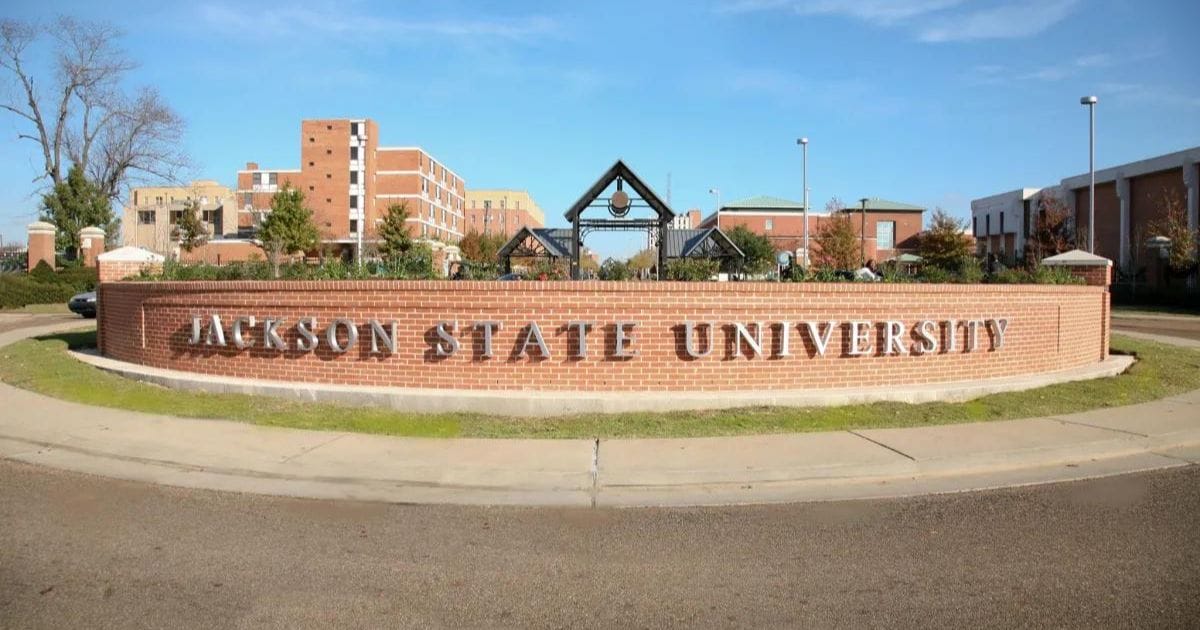Source: Jackson State University/Facebook
Classes were canceled for the day, the Mississsippi HBCU announced.
A student from Chicago at Jackson State University was killed following a shooting on its campus as homecoming festivities wound down this weekend. It was the second shooting on the Mississippi HBCU’s campus in as many days.
Jaylen Burns was taken to a local hospital before being pronounced dead on Sunday night following reports of a shooting at an apartment complex, according to WAPT.
The technology major from Chicago was remembered by Jackson City Council member Brian C. Grizzell as a campus leader.
“My heartfelt condolences go out to the Jackson State University Family, particularly the Delta Phi Chapter of Alpha Phi Alpha Fraternity, Incorporated, on the devastating loss of Bro. Jaylen Burns,” Grizzell wrote in a Facebook post on Monday morning. “Although I didn’t have the privilege of knowing Jaylen personally, our shared bond in the House of Alpha, especially within Delta Phi, reminds us of the strength of our fraternity brotherhood. May Jaylen find eternal peace in Omega, our Chapter of Sweet Rest.”
Acting Jackson State President Elayne Hayes-Anthony notified students in a message Monday morning that classes would be suspended for the day.
“Our thoughts and prayers are with Jaylen’s family, friends and all those who knew him,” Hayes-Anthony wrote to students and the campus community. “He was an ambitious and bright young man, who believed in being of service as a member of Alpha Phi Alpha Fraternity and president of Men of Excellence. We grieve the tragic loss of his life due to this act of violence.”
The 1400 Klub extends our deepest condolences to the family and friends of Jaylen Burns. Our thoughts and prayers are with the Burns Family, the brothers of the Delta Phi Chapter of Alpha Phi Alpha Fraternity, Inc., and fellow Chicago Jacksonians.
— The 1400 Klub (@1400Klub) October 16, 2023
May Jaylen's legacy continue… pic.twitter.com/HYEHRNlymr
It was the second on-campus shooting at Jackson State in two straight nights.
On Saturday night, gunfire broke out “involving two individuals who are not affiliated with Jackson State University,” the school posted on the social media app formerly known as Twitter. “We are thankful that no students were involved or harmed.”
(1 of 3) JSU Campus Safety Update – We are aware that a shooting took place late last night on Dalton Street involving two individuals who are not affiliated with Jackson State University. We are thankful that no students were involved or harmed.
— Jackson State U. (@JacksonStateU) October 15, 2023
The shooting in Mississippi’s capital city came amid a recent spate of gun violence at HBCUs.
In Maryland, five people were shot on the campus of Morgan State University in Baltimore on Oct. 3. While no one was killed, four of the victims were identified as students. They were all left with non-life-threatening injuries. The shooting came at the beginning of a week of Morgan State’s annual homecoming festivities. It was the third consecutive year that its homecoming events were disrupted by gun violence. As a result, Morgan State canceled its homecoming plans for this year, the first time in its history the school has ever done so.
Days later and about an hour south in Prince George’s County, there was a shooting on the campus of Bowie State University, which had invited Morgan State students to attend. In that instance, at least two people were shot near Bowie State’s Center for Business and Graduate Studies.
The shootings on HBCU campuses have come at a time when HBCU leaders and advocates have been demanding more funding from the federal government to further secure historically Black college campuses.
Lodriguez V. Murray, UNCF’s senior vice president for public policy and government affairs, said in August that Congress hasn’t matched the urgency shown by the situation at hand.
“All year long, we have asked Congress to protect HBCUs, and now is the time to pass the Homeland Security appropriations bill with language that directs the Federal Emergency Management Administration (FEMA) to provide $100 million for HBCUs (annually) via the non-profit grants’ security program,” Murray said in a statement. “This program must administer the funds directly to HBCUs, not by the state governments. This will help HBCUs to be protected against threats by increasing security, developing plans on how to respond beyond simply calling the police, heighten the use of technology to monitor campus entry points, and make our environments the safe haven for learning they should be for the sake—and mental health and security—of our students.”
This article originally appeared on NewsOne.






